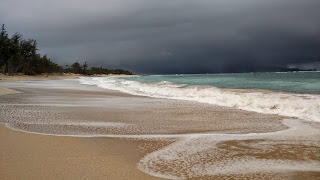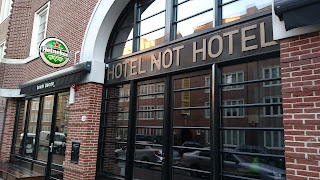Trasnochar
Mauricio constantly marvels at the lexical depth of the English language. It seems we have a word for everything while Hispanics use meandering oxygen on describing the English equivalent. Three examples are heel as the end piece of a loaf of bread, serendipity as the joy evoked from the happy accident and the utilitarian verb outfit, to provide one with the necessary equipment. English, it seems, is a very rich language without the phoenetic beauty while Spanish is a very beautiful language without the linguistic richness.
In my new goal of learning Spanish, Italian and Irish, I've started to first practice Spanish as it is the lowest-hanging-fruit (a beautiful English phrase that has no Spanish equivalent, fyi). But it seemed like Spanish always seemed deficient in the vocabulary department. This morning, however, Mauricio and I started rapping about time and schedules. He described the gem trasnochar which in English is roughly to translated as "to cross the night" or more, neatly "to stay up all night."
I've tried for hours but I cannot find an equivalent word in English. Maybe it's because we have no nocturnal culure in 99% of the U.S. or that we secretly worship Ben Franklin's tongue-in-cheek advice that "Early to Bed, Early to Rise makes a young man healthy, wealthy and wise." Is it our puritanical, yankee roots (no pun intended) which offer no linguistic box to the poetic-sounding "crossing the night?" Even in my old days in the rave and club scene I do not remember a neat definition beyond the verb party. But transnochar doesn't have to involve anything illicit. You can say in perfect innocence Yo trasnoche' esudiando para la exam (I stayed up late to study for the exam).
Boston and San Francisco both have a wide and lovely linguistic diversity with high numbers of speakers conversing in Spanish, Mandarin and Cantonese. The one safe difference is that Boston has more Portuguese speakers with its Brazilian immigrant and old Portuguese comunities while San Francisco has a high number of Tagalog speakers. Tagalog is also known as Filipino. Our first suburb to the south, Daly City, also known as Little Manila, is peopled by families from the Phillipines. San Francisco proper also has high numbers of Russian, Italian, Armenian, Japanese and Vietnamese conversants.
My new favorite wonkblog, GeoCurrents, has a whole special series on Northern California and its languages. The Golden State actually leads the country in the number of Spanish speakers. And we just trail New Mexico in the number of primary Spanish speakers per capita (although Texas is right on our high heels)!
For weeks, I've been debating whether to study German, French or Italian in addition to continuing Spanish and tackling Irish-Gaelic. I've settled on Italian because I want to go to North Beach and order gelato with confidence. Sure, French may open up many tropical corners of the world and German is great if I ever want to work in Central Europe but, let's face it, Italian is the most beautiful of languages. Don't you agree?
In my new goal of learning Spanish, Italian and Irish, I've started to first practice Spanish as it is the lowest-hanging-fruit (a beautiful English phrase that has no Spanish equivalent, fyi). But it seemed like Spanish always seemed deficient in the vocabulary department. This morning, however, Mauricio and I started rapping about time and schedules. He described the gem trasnochar which in English is roughly to translated as "to cross the night" or more, neatly "to stay up all night."
I've tried for hours but I cannot find an equivalent word in English. Maybe it's because we have no nocturnal culure in 99% of the U.S. or that we secretly worship Ben Franklin's tongue-in-cheek advice that "Early to Bed, Early to Rise makes a young man healthy, wealthy and wise." Is it our puritanical, yankee roots (no pun intended) which offer no linguistic box to the poetic-sounding "crossing the night?" Even in my old days in the rave and club scene I do not remember a neat definition beyond the verb party. But transnochar doesn't have to involve anything illicit. You can say in perfect innocence Yo trasnoche' esudiando para la exam (I stayed up late to study for the exam).
Boston and San Francisco both have a wide and lovely linguistic diversity with high numbers of speakers conversing in Spanish, Mandarin and Cantonese. The one safe difference is that Boston has more Portuguese speakers with its Brazilian immigrant and old Portuguese comunities while San Francisco has a high number of Tagalog speakers. Tagalog is also known as Filipino. Our first suburb to the south, Daly City, also known as Little Manila, is peopled by families from the Phillipines. San Francisco proper also has high numbers of Russian, Italian, Armenian, Japanese and Vietnamese conversants.
My new favorite wonkblog, GeoCurrents, has a whole special series on Northern California and its languages. The Golden State actually leads the country in the number of Spanish speakers. And we just trail New Mexico in the number of primary Spanish speakers per capita (although Texas is right on our high heels)!
For weeks, I've been debating whether to study German, French or Italian in addition to continuing Spanish and tackling Irish-Gaelic. I've settled on Italian because I want to go to North Beach and order gelato with confidence. Sure, French may open up many tropical corners of the world and German is great if I ever want to work in Central Europe but, let's face it, Italian is the most beautiful of languages. Don't you agree?







Comments
Post a Comment